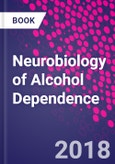Table of Contents
Section I: Neurocircuitry of Alcohol Dependence 1. Frameworks of alcohol addiction: Alcohol addiction as a reward deficit and stress surfeit disorder 2. Basal ganglia networks and mechanisms of voluntary actions: implications for alcohol addiction and dependence 3. Prefrontal limbic striatal circuits and alcohol addiction in humans 4. Molecular adaptations in mesolimbic circuitry and pathological ethanol intake 5. The bed nucleus of the stria terminalis: A critical site of ethanol-induced alterations in neurotransmission 6. Stress and alcohol drinking behavior 7. Alcohol and developing neuronal circuits 8. Human imaging studies of brain circuitry disrupted by alcoholism Section II: Neurosignaling and Neuroplasticity of Alcohol Dependence 9. From signaling pathways to behavior: The light and dark sides of alcohol 10. Glutamate signaling in alcohol abuse and dependence 11. Central amygdala neuroplasticity in alcohol dependence 12. Neural plasticity in the ventral tegmental area and alcohol dependence 13. Extrasynaptic GABA receptors and alcohol 14. Cannabinoids and the neural actions of alcohol 15. Impact of alcohol abuse and dependence on the structure and function of the prefrontal cortex 16. Molecular mechanisms underlying the development of functional and behavioral tolerance to alcohol Section III: Gene and Behavior 17. Alcohol and the brain: An epigenetic viewpoint 18. The genetic complexity of alcohol drinking in rodents 19. Alcohol dependence, withdrawal, and relapse 20. Insights from non human primates on risks for drinking to dependence 21. The potential role of glucocorticoids and the HPA axis in alcohol dependence 22. Anxiety and alcohol use disorders: A perspective from molecular and epigenetic studies 23. The genetics of alcohol responses of invertebrate model systems 24. MicroRNAs in alcohol abuse and toxicity 25. Gene and behavior 26. Complex genetics of alcoholism








